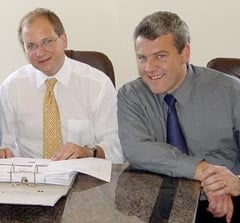High Court finds in favour of Costas Sakellarious, MD of Pisani, in case brought by former Director Nick Telfer
Judge Mackie QC published his judgement on 19 June of a case heard in The High Court of Justice, Queen's bench Division, Commercial Court, between Nicholas David Telfer, a former Director of stone wholesalers Pisani, and Costas Sakellarios, the Managing Director of Pisani PLC. He found in favour of Costas Sakellarios.
Mr Sakellarios, from Greece, was a director and only shareholder of Pisani PLC, which carried on business in the UK and of which Mr Telfer had been a Director but was no longer employed by the company. While Mr Telfer was a Director of Pisani, Mr Sakellarios agreed that Mr Telfer would have an interest in the company and, accordingly, a deed was signed which required Mr Sakellarios to make a series of payments to Mr Telfer.
Mr Telfer brought proceedings claiming payment under the deed. The issue was whether the payments under the deed were payments of employment income and whether the defendant had sufficient tax presence in the UK to be obliged to deduct tax. The Chancery Division, in dismissing the claim by Mr Telfer, held that the payments were employment income from which Mr Sakellarios had been obliged to deduct tax.
The claim by Mr Telfer was for payment of about £930,000. The liability was undisputed in principle but Mr Sakellarios claimed he should have deducted PAYE on past payments and also on those now overdue but not yet made. The dispute raised issues of tax law, the application of which depended on differences about the construction of the deed and about the facts.
Under the deed, dated 4 January 2007, between the parties, Mr Sakellarios agreed to make payments totalling £2,820,000 to Mr Telfer in accordance with an instalment plan contained in the schedule. By 7 May 2010, Mr Sakellarios had paid a total of £1,940,301 but had fallen behind with the payment schedule.
By a supplemental deed dated 7 May 2010, the original deed was varied to give more time for payment. Since 7 May 2010, Mr Sakellarios had made further payments totalling £155,000. The claim for the extra £930,000 failed, said Judge Mackie, in that Mr Sakellarios was obliged to deduct tax at the higher rate on the payments he made to Mr Telfer.
Mr Sakellarios also had, in principle and subject to the facts as they later emerge, a right to claim reimbursement for past sums which should have been deducted but were not.
Judge Mackie said the parties had given late and partial disclosure about their dealings with and investigations by HMRC. Notionally the whole case was about ensuring that any appropriate deductions were made in respect of money due to HMRC.
Judge Mackie in his published Judgement says: "I am not at present prepared to accept the submissions made by each side that there is no risk of windfall or of HMRC not receiving what is due. I am minded, subject from hearing from Counsel, to decline to make any orders for payment to the Claimant or for reimbursement to the Defendant until it is clear when and in what way, following full disclosure to HMRC, the tax obligations revealed in this case will be met. Apart from paying regard to the public interest it will not be just for me to make a final decision on what if anything should be paid as between the parties until the picture is clear."

